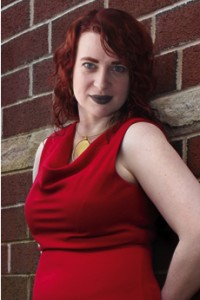Kameron Hurley: Hard Publishing Truths: Relationships Matter
 One of my favorite publishing stories is from an established short story writer who tweeted that a story of his had been rejected from a magazine. Within a few minutes of sharing that, the editor of the publication e-mailed them and apologized for the rejection. ‘‘Our new slush reader didn’t recognize your name,’’ the editor said, and promptly bought the story.
One of my favorite publishing stories is from an established short story writer who tweeted that a story of his had been rejected from a magazine. Within a few minutes of sharing that, the editor of the publication e-mailed them and apologized for the rejection. ‘‘Our new slush reader didn’t recognize your name,’’ the editor said, and promptly bought the story.
The myth of the meritocracy runs deep in publishing. ‘‘Just write a good book!’’ is offered up as the singular cure to all of a writer’s worries about the financial success of their title. But writing a good book is no more a magical recipe for success than ‘‘working hard’’ is a guarantee one will retain gainful employment. As in any industry, there are simply too many factors at play.
And yes, one of those factors is still who you know.
No one likes to hear this. I certainly hated hearing it when I was first starting out. Yet I asked myself the question, often, about how it was that what I saw as inferior stories by established writers were getting picked up when mine were about on par with some of them. The truth was that – all things being equal – they had name recognition.
And I didn’t.
There’s a reason I got into writing, a profession where 98% of the work is done in solitude. I believed firmly and passionately that all I had to do was ‘‘write a good book’’ and that ‘‘good book’’ would be picked off the slush pile and deliver me into the welcoming arms of the publishing industry. This is not how it works for everyone. It’s not how it works for most people.
Here’s how my first book was published:
1) Someone who worked in PR at a publisher was a frequent reader and commenter on my blog (which I’d had for three years at that point). She asked to read the book I had just announced that I’d finished. She liked the book, and recommended I send the manuscript to an editor she knew.
2) I queried that editor, who asked to see the book. While the book sat with the editor, I contacted agents, mentioning that the book was already on an editor’s desk.
3) I got an agent, in no small part, I’m sure, because the manuscript was already on an editor’s desk (I had tried to get an agent for two prior books, and none were interested). The editor who had requested the book asked for some rewrites, but ultimately declined.
4) My agent sent the book out to a bunch more places. Everyone declined.
5) An editor at a house that had already declined the book e-mailed my agent, saying something like, ‘‘I heard online that Kameron has a book on submission. Why didn’t you send it to me instead of my colleague (who had already rejected it)? I read a story of hers online awhile back and liked it.’’ We signed a 3-book deal twenty-four hours later.
6) My acquiring editor was laid off. My book contract was cancelled just after we got through copyediting.
7) I was invited by a writer I knew to write up a guest post on their blog about the experience of having a book contract cancelled (I’d written a review of their work on my blog years before, and we had started some e-mail correspondence, and met a couple times at cons).
8) That blog had lots of traffic from industry pros, and two small press editors contacted my agent asking to see the manuscript. We signed with one of them for a two-book deal.
9) Entire process from first editor’s desk to publication: four years.
That book that was almost not published was nominated for and won several awards.
I write books that blend science fiction and fantasy, and they tend to be full of women chopping up things, and there are few to no white people in them. The sorts of books that I write were an even tougher sell back there in 2007 before the We Need Diverse Books movement. The connections I made along the way helped me overcome those hurdles, and they can help people overcome them now. The trouble is that they can be very difficult for people from disadvantaged backgrounds to cultivate. These relationships aren’t necessary, but they are helpful, and not having them can certainly contribute to feeling isolated and burned out in this industry. The Internet has helped alleviate this somewhat, and has opened up access to networks. Cultivate them, please, in whatever way you are able. And if you are already established, hold a hand out to newer writers. It’s your turn now.
Writing is a business like any other, and our approach to the industry needs to be clear-headed. I love a good fairy tale just as much as anyone, but it’s the fairy tales that we tell about this business that sink so much new talent. I’ve been in the business long enough now to see new writers coming up behind me full of the same expectations about how just writing a good book (whatever a ‘‘good’’ book is) will guarantee success. When they don’t find the financial or critical success they expect within the first five years of their career, they figure they are doing something wrong, that their work isn’t good enough, and they give up. This breaks my heart.
Certainly, we should level up our craft, but poor craft alone does not sink books. Books don’t succeed commercially for all sorts of reasons. We spend so long getting writers to focus on craft that we don’t talk to them enough about business, and it’s running face first into the business-end of publishing and being ill-equipped to handle it that sinks some of the best and brightest, toppling them from the mountain long before they approach the peak.
So, writers, after you have leveled up your skill enough to write a good book, here are some other things that can assist you in launching a writing career that makes you enough money to buy ramen:
1) Understand that you’re an entrepreneur now. Read up on small business ownership, LLCs, basic tax information for freelancers, and budgeting. We aren’t taught these things in school. There’s no shame in that. You learned how to write. You can learn how to run your business.
2) Connect with other writers. I wanted to say ‘‘Make friends,’’ here, but the truth is that the people in this industry should probably be considered work colleagues, and yes, you should get to know them in the same way. This is not about ‘‘schmoozing’’ or making a list of people to hit up for a favor at a con. That’s not how it works. Find people who enjoy the stuff you do, folks whose work you enjoy, whom you actually want to hang out with, and don’t be afraid to offer to buy them a drink at a convention, interact with them on Twitter about a shared fandom, or whatever. Not only will you be more likely to come top of mind when they’re thinking of people to invite to be on projects, but if you listen to their business talk with other writers, you will learn a lot of things about the industry.
3) Note that your agent’s and editor’s interests and yours are aligned, but not the same. It’s easy to get into a relationship with an agent or editor when you’re new in which you perceive them as having all the power and insight. And yes, they are more established in the community and understand the business better and you should consider their advice. But keep in mind that what your career goals are may line up with what they want. Be forthright. Figure out what’s most important to you, and insist on it. No one is more invested in the outcome of your career than you. No one.
You are going to spend a lifetime perfecting your writing skill. I urge you to invest just a few hours every month in learning the business, too. Don’t spend all that time climbing the mountain only to realize you forgot the climbing gear just when you need it most.
Kameron Hurley is the author of The Stars are Legion and the award-winning essay collection The Geek Feminist Revolution, as well as the God’s War Trilogy and The Worldbreaker Saga. Hurley has won the Hugo Award, Kitschy Award, Locus Award, BFA Award, and Sydney J. Bounds Award for Best Newcomer. She was also a finalist for the Arthur C. Clarke Award, the Nebula Award, and the Gemmell Morningstar Award. Her short fiction has appeared in Popular Science Magazine, Lightspeed Magazine, and many anthologies. Hurley has also written for The Atlantic, Bitch Magazine, The Village Voice, and Entertainment Weekly. She posts regularly at KameronHurley.com.
From the June 2016 issue of Locus Magazine






That story about the rejection turned sale really bothers me. My (semipro-level) publication has received many submissions from well-known writers who’ve been published in the big pro magazines, and we’ve rejected the majority of them. Why? Because, frankly, the stories weren’t up to our standards. A strong track record of publications doesn’t mean that everything you write will be gold. I’m honestly disappointed in my colleagues in the field who value names over quality. (But yes, it’s important to remember that such people exist. It just sucks.)
As a writer it nags at me, but as a reader I have to admit I perk up if one of my favorite authors’ names appears on an anthology or magazine cover, at which point even if I read and say “eh not their best,” I’ll then read the rest. So it bothers me, but I understand it from the POV of wanting to lure in that fanbase. But then again, personally I’d rather be rejected than have something accepted only to reflect poorly on me, so my thoughts are a muddle on this!
This whole post is great, but man, that last paragraph? Way to stick the landing. Thank you for sharing this — it’s great food for thought.